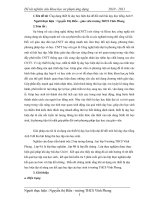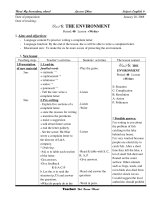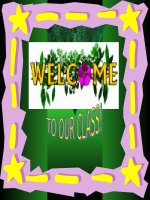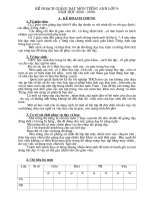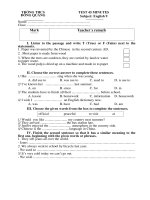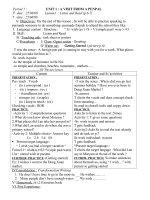Anh 9 from Unit5 and Review
Bạn đang xem bản rút gọn của tài liệu. Xem và tải ngay bản đầy đủ của tài liệu tại đây (129.51 KB, 18 trang )
Week 16
Period 31
Unit 5 ( continued)
Lesson 3: LISTEN + LANGUAGE FOCUS 3 & 4
A/ Objectives : - By the end of the lesson ss will be able to get information about the media
- Practice using gerund after some verbs
- Develop Ss listening skill
B/ Language contents : Gerund after some verbs
C/ Teaching aids : English 9 Text book, tape and a casette player.
D/ Ways of working : T- WC, individual & pair work.
E/ Procedure :
T
Stages
1.Warm up
Teachers activities
I - Warm up : Brainstorming
- get Ss to think of the types of media they have
known
- then get Ss to write on the board
Television
Magazine
Students activities
Discuss the types of the media in
groups
Then go to the board and write
Internet
Documentary
Stories
Types of
the media
Films
News paper
Radio
- Check again with the whole class
- Praise the winner
II - Pre- Listening
1- Preteach vocabulary : elicit from Ss
. telegraph
( n ) : điện báo
. major
( adj) : chính, quan trọng
. force
( n ) : lực lợng, sức mạnh
. journalism
( n ) : nghề báo
. viable
( adj ) : có, có khả năng tồn tại
. newsreel
( n ) : Phim tài liệu
-> checking vocabulary : R.O.R
2- Prediction : Open prediction
- set the scene : Chau is doing an assignment about
the media, she wants to ask her father some
information to do the assignment.
- Have Ss focus on the details in the table on page 43
then
guess and fill in it
- cpllect Ss ideas
III- While - Listening :
- Get Ss to listen to the tape and check their
prediction x 2
- Get Ss to pair- compare
- Listen and repeat in chorus and
individual
- say meaning, stress
- Rewrite on the board
- Listen to the teacher
Listen to the tape and check
prediction
- give feed back
** Answer keys :
When?
7th or 8th century
(a)… The late 19th century
Early 20th century
The first printed newspaper appeared in China
The telegraph was invented
Two new forms of news media appeared…(b)
newsreel
(c)… In the 1950s
Television became popular
mid and late 1990s
(d)…became a major force in journalism
- Correct the answers if
- thnen play the tape to check again
necessary
IV - Language focus 3 & 4 :
+ Model sentence: elicit from Ss and write on the
board
I like watching TV
Nam enjoys playing soccer
- Get Ss to repeat the model
- concept checking : - meaning
- form : S + V + gerund
( Ving)
- Use : Gerund is used
after some verbs such as : enjoy, like, dislike, love,
- Repeat the model and say
hate, avoid….
meaning,form, use refering the
+ Practice : Word cues drill ( Exercise 4 on page
model
46)
- get Ss to run through vocab ( page 46 )
- get Ss to read the model dialogue (page 46 )
- T- WC
- give Ss 4 minutes to prepare in groups ( make
sentences using the words given in the box and
- work in groups first then say
some verbs : like, enjoy…)
aloud before the class
Ex:
. I enjoy writing letters but my sister doesn’t.
She enjoys watching advertisements
. My father likes listening to music but my
sister doesn’t.She loves watching TV
V- Production:
* Exercise3 on page 46
- give instruction
- focus on the model
- elicit an example ( use the words givenon page 46 )
- get Ss to work in pairs
Ex : Do you like reading detective stories?
Yes, I do
Do you enjoy listening to music?
No, I hate it.
VI- Homework:
- Do the exercises 3 & 4 into the note books
- Prepare section READ on page 43
Period 32
Unit 5
( continued)
Listen to the teacher
Work in pairs
Copy in the note book
Lesson 4: READ (page 43 - 44)
A/ Objectives : - By the end of the lesson ss will be able to get some knowledge
about the Internet
- Develop Ss reading skill
B/ Teaching aids : English 9 Text book, poster & picture
C/ Ways of working : T- WC, individual & pair work.
D/ Procedure :
I- Warm up : Chatting
- show the picture of a computer and ask Ss some questions
about it :
What is this?
Can you use a computer
Have you ever used the Internet?
Do you find the Internet useful?
What do you use the Internet for?
II- Pre- Reading :
1. Preteach vocabulary: (elicit from Ss)
. forum (n) :diễn đàn
. surf ( v) : lớt sóng
. deny (v) : từ chối, phủ nhận
. to get access to : tiếp cận ( accesible (a) )
. spam ( n) : th rác
. limit (v ) : giới hạn -> limmitation (n)
. alert (adj) : cảnh giác, tỉnh táo
. wander (v) : đi lang thang
- > Check vocab : Matching
2 . T/ F statements prediction
- set the scene : There is a forum on the Internet. You will
read the statements (on the poster) and work individually to
predict which statements are true and which one are false
a. Internet is a wonderful invention of modern life.
b . The Internet is available not only in cities but also in the
countryside.
c. People use the Internet for two purpose : Education and
entertainment.
d. Bad program is one of the limitation of the Internet.
e. You should alert when using the Internet.
- give Ss 2 minus to predict
- then collect Ssideas
III- While - reading
1. Check predictioin
- Get Ss to read the forum and check with their prediction
- Give feed back
** Answer keys:
a. T
b. F
c. F
d. T
e. T
2 . Guess meaning from context
- Get Ss to match each English work with a Vietnamese one
- Listen and answer
the teachers
questions
- give the words
possible
- Listen and repeat
in chorus and
individual
- say meaning
and stress
- match on the
board
- listen to the
teacher
- work
individually
( read the
statements and
guess which ones
are true or which
are false)
Work
individually( read
the text and check
prediction)
Match on the
1 . increase
*
a. kh¸m phÊ
2 . convenient
*
b. sù rñi ro, m¹o hiÓm
3 . explore
*
c. t¨ng lªn, gia t¨ng
4 . risk
*
d. th r¸c ®iÖn tö
5. electronic- junk mail *
e. tiÖn lîi, thuËn tiÖn
6. time- consuming
*
f. mÊt nhiÒu thêi gian
** Answer keys :
1- c
2 -e
3- a
4 -b
5- d
6-f
3. Comprehension questions:
- Have Ss to read the text again to find out the answers to
the questions on page 44.
- Then get feed back from Ss
** Answer keys:
1- Sandra use the Internet to get information and to
communicate with friends and relatives.
2- Because she lives in the countryside where the Internet is
unavailable
3- People use the Internet for Education, communication,
Entertainment, and commerce.
4- Fast and convenient ways to get information are :
. Communication
. Education
. Entertainment
. Commerce
5 - Yes, there are some disadvantages :
. time- consuming
. costly
. dangerous because of virus and bad programs
. spam / electronic junk mail
. personal leaking
IV- Post- Reading
- Get Ss to dicuss questions 6 & 7 on page 44 then check
with the WC ( Call each group to give their ideas/ response to
the forum)
V- Homework
-Write the answers to the questions into the exercise note
books
- Prepare section WRITE on page 44
* Guide :
- Read the text about the Internet again and again
- Prepare the ideas for section “ write”
board
Work in
pairs( read thetext
again and answer
the questions)
- Work in 4
groups
- copy in to the
note books
…………………………………………………
…………………………………………………
…………………………………………………
…………………………………………………
………………………………………………….
Week 17
Period 33
Unit 5 ( continued)
Lesson 5 : Write (page 44)
A/ Objectives : - By the end of the lesson ss will be able write a paragraph about
the benefits of the Internet.
- Develop Ss’ writing skill
B/ Teaching aids : English 9 Text book
C/ Ways of working : T- WC, individual & pair work, and groupwork.
D/ Procedure :
I/ Warm up : Brainstorming
Work in groups
- give Ss 1 minus to discuss their favorite activities
first (discuss to find
- then get Ss to write on the board
out their favorite
chatting with friends
activities)
listening to music
playing games
Favorite activities
reading newspaper
watching TV
Write on the board
Using the Internet
Give feed back from Ss
II/ Pre- Writing
+ Speaking :
- get ss to ask and answer about their favorite activities and
time for them, using the “ Brainstorming”
Ex : Which is your favorite activities in your free time?
Answer the
( Watching TV/ playing soccer/ Using the Internet…)
How many hours a week do you spend watching TV/ using teacher’s questions
the Internet?
( 4 or 5 hours, I guess)
+ Reading & Discussing:
- Have Ss read the text ( page 43 - 44 ) again then answer
the question 4 “ Make a list of benefit of the Internet ”
Work individually
- Have Ss dicuss the benefits of the Internet:
. as a source of information: news, articles, weather
forecast, …
. as a source of entertainmant : music, movies, games…
. as a means of education : on - line schools, on - line
lessons, self- study,...
. easy and covenient to get information
. communicate with friends, relatives, ( e- mail, chatting,
web cam…)
III/ While- Writing:
- Remind Ss how to give the details in a logical way
Ex: We can use the words “Firstly/ Secondly/Thirdly/
Besides/ …”
- Have Ss use the ideas they’ve just dicussed to write a
paragraph about the benefits of the Internet in 12 minutes.
Discuss in groups
Work in 4 groups
( write on the
poster/ extra
board)
** Suggested Writing:
Benefits of the Internet
The Internet is increasingly developed and become part of our evedy day life.
And noone can deny the benefits of the Internet.
Firstly The Internet is a source of information. It is really a very fast and
convenient way to get information. You can get the latest local or global news easy.
You can check weather conditions before you go every/ some where… Ex: Go
camping/ fishing/ out doors…You can find a timetable and maps of the buses you
want to take; you can book your tickets for the next concert or soccer match, trip
or hotel.
Secondly The Internet is a very fast and cheap way to communicate with your
friends or relatives by means of email, chatting, webcam…
Besides, The Internet is a source of entertainment, you canlisten to all kind of
music, the radio, watch videos.We use the Internet not only to play games but also
to read novels, do virtual (¶o) sight seeing…
Thirdly the Internet is also a rich source of educational materials, courses. We
can learn English through many interesting programs. We can look up a dictionary,
take a training or learning course on the Internet.
The Internet is a wonderful invention of modern life . And it makes our world a
small village
IV/ Post- Writing : Exhibition
Look at the poster
- Get Ss to hang their poster on the board
and find out the
- Then check again before the class ( correct the mistakes
mistakes
V/ Homework
- Write the paragraph about the benefits of the Internet again
Copy into the note
into your exercise note books
books
- Write another paragraph about thebenefit of the Internet
refering the section READ on page 43
Ex: Time- consuming/ costly/ viruses/ bad program
spam/ electronic junk mail/ spam/ electronic junk mail/.
spam/ electronic junk mail/ personal information leaking…..
Period 34
Unit 5 : ( continued)
Lesson 6 : Language focus ( 45 - 46 )
A/ Objectives:
- By the end of the lesson Ss will be able to use and make tag- questions .
- develop Ss’ speaking skill, the ability of using the structure and vocabulary.
B/ Teaching aids: text book
C/ Ways of working : T- WC, pair work, Individual work.
D/ Procedures
I- Warm up : + Brain storming
- Get Ss to think of the activities in the free time and write 6
or7 ones on the board
Watching TV
Playing soccer
Activies in free time
Reading picture books
Write 6-7 activities
on the board
Listening to music
Playing video games
…
+ Guessing games:
- get Ss to play “ Guessing games” by asking and answering
the question :
“ Do you often listen to music in your time?”
Yes/ No
II/ Presentation:
1- Preteach vocabulary: ( elicit from Ss )
. website
(n) : trang web
. publish
(v) : Ên hµnh
. cable TV (n) : truyÒn h×nh c¸p
. quiz
(n) : cuéc thi ®è vui
-> Check vocab: R.O.R
2- Model sentence:
- Give the situation, elicit the model sentences from Ss and
write on the board
You like reading magazines, don’t you?
He is an excellent student, isn’t he
Mai can’t swim, can she?
She doesn’t like films, does she?
-> Concept checking:- meaning
- Form : S + V…, Vn’t + S ?
S + V not…, V + S ?
+ Tag- question has the same auxiliary as the main clause if
the main clause has the full verb “ be”, modal verb, have
got, we use them again in the tag- question.
+ If the clause has the ordinary verb in the present & past
simple tense-> We use the auxiliary verb” do, does. did” in
Get into games
Listen and repeat
Say meaning, stress
and Vietnamese
Rewrite on the
board
Listen to the
teacher’s situation
and give the model
sentence if possible
Say meaning/ form.
Take notes
question tags.
* Intonation : - If we are asking a real question, we use
the rising intonation
- If we are sure about the answer, we use
a falling intonation.
3- Practice :
a. Drill : Make question tags
1. You don’t watch TV,…………….?
2 . She likes films,……………… ?
3. They enjoyed listening to music,……….?
4. He can speak English well,……………?
5. They didn’t enjoy playing chess, ………..?
- then get feed back from Ss
** Answer keys :
1. do you
2. doesn’t she
3 . didn’t they
4. can’t he
5. did they
b. Complete the dilogue (45)
- Get Ss to do the exercise in pairs, complete the tagquestions of the dialogue
- then get feed back
** Answer keys:
a. haven’t you
b. didn’t he
c. wasn’t it
d . do you
e . aren’t we
III/ Production:
- Have Ss look at the table on page 45
- get them to ask and answer the question about television
programs these people like or dislike, using tag- questionss
Ex: .Tuan doesn’t like music, does he?
No, he doesn’t
. Mai and Anh like music, don’t they?
. Yes, they do?
……..
- Get Ss to practice in 5’
Work in pairs
Give the answers
then correct if
necessary
Pair work( write the
tag- questions to
complete the
dialogue)
Work in pairs
V/ Homework
- Write it up: write exercise 2 on page 45 into your exercise note books
- Revise the tenses, the passive, the reported speech..for the next period REVISION
Guide:
- Revise the form, and how to change into the passive
Ex: Form : S+ be + past participle
Active sentence : S + V + O Passive?
- Revise the reported verbs and how to change into the reported sentences
+Reported comand
+ reported questions
+ reported statement
………………………………………………..
………………………………………………..
………………………………………………..
………………………………………………..
………………………………………………...
…………………………………………………
…………………………………………………
Week 18
Peirod 35
revision
A/Objectives : By the end of the lesson Ss will be able to consolidate some
knowledge about the tenses, prepositions, wishes, conditional sentences, tagquestions… and further practice using them.
B/ Teaching aids: Extra board
C/ Ways of working: T- WC, individual work, pairk.
D/ Procedures:
I / Warm up:
Chatting
- T. asks some questions to make the class atmosphere more Answer the
interesting
teacher’s questions
How are you today?
Do you find the test important for you?
Are you ready for test?
Do youwant to get good marks?
How can you get good marks?
Maybe: - revise well
- pay attention to the test while doing it………
II/ Revision:
1- The wishes:- Ask some questions:
Can you show me the form of the present wishes?
- Answer the
Can you give examples?
questions
Ex:
S + wish + S + past subjunctive
I wish I were a pilot.
Nam wishes his friends came to his party.
2- Conditional sentences type I:
Have you learned conditional sentences type I?
Can you show me the form and use of the conditional
sentences type I?
If + S + Present simple,S + will
+V(bare infinitive)
Modal verbs
( can/ may/..)
Give some
examples
- Yes
Copy into the
notebooks
- Get Ss to give examples
Ex:
If she doesn’t come soon, she may be late for for the meeting
3. The reported speech:
- get Ss to give the form of the reported sentences
Give the form of
a. Reported command: S + asked/ told+ sb + (not) to- V…
the reported
b. Reported statements:
speech
S + said
+ (that) S + V ( qóa khø t¬ng ®¬ng)
said to sb
told sb
c. Reported advice:
* S + advised + sb + to - V ( infinitive)
* S + said ( to sb) that + S should + V ( bare infinitive)
told sb
d. Reported questions:
S + asked sb
If/ whether
+ S + V (qkt®)
wanted to know
Wh
III/ Practice:
I/ Put the following sentences into the opposite voice:
1. They will translate this book into Vietnamese.
2. The medals were presented by Nelson Mandela.
3. Noone could do anything to put the fire out.
4. You shouldn’t expect your friends to help you.
5. Bananas are exported to Europe.
6. They have discovered oil at the North Pole.
7. Some stole all our money and passports.
8. A new hospital is being built in my neiborhood.
9. Where do people speak English?
10.Fortulately, the machinery wasn’t damaged by the
accident.
* Answer key:
1. This book will be translated into Vietnamese.
2. Nelson Mandela presented the medals.
3. Nothing could be done to put the fire on.
4. You should expect to be helped by your friends.
5. They export bananas to Europe.
6. Oil has been discovered at the North Pole.
7. All our money and passports were stolen.
8. They are building a new hospital in my neiborhood.
9. Where is English spoken?
10. Fortunately, the accident didn’t damage the machinery.
II/ Multiple choice: Choose the best answer to complete the
following sentences:
- Get Ss to do the “ Multiple choice”
1. Make sure you end each sentence with a……………..
A. dot
B. point
C. comma
D. fullstop
2. Oil……..in many parts of the Persian Guff.
A. has found B. finds
C . is found
D. is finding
3. You should take more exercises if you want to keep …….
Copy the notes
into the notebooks
Work in pairs first
then write on the
board
Correct the
answers if
necessary
Work in
pairs( discuss and
find out th
answers)
A. fit
B. fat
C. fine
D. fresh
4.She said that she ……………..you someday.
A. had visited B . has visited C. will visit D. would visit
5. It was………a difficult questionthat we couldn’t answer.
A. so
B. such
C. very
D. too
6. Mr Brown ………. in the army from 1960 to 1980.
A. had served B. has served
C. served
D. is serving
7. These clothes are ………..cleaner than the others.
A. as
B . very
C. so
D. much
8. Nobody has………done this before.
A. any
B. not
C. never
D. ever
9. My sister won’t get married until she ………25 years old.
A. isn’t
B. is
C. will be
D. ha been
10. I ………the money from him yet.
A.haven’t received B. don’t receive C. will receive D. receive
-give feed back
** Answer key:
1. D 2. C 3. A 4. D 5. B 6. C 7. D 8. D 9. B 10. A
Correct the
answers if
necessary
III/ Rewrite the sentences using the reported speech:
1. “ I want some books.”, Nam said
2. “ What are you doing now?”, Peter asked his mother.
3. “ Does your father get to work by bus?”, Tam said to Ba.
4. “ Where do you often spend your summer vacation?”, Mai asked me.
5. “ Come in and tell me how you feel now?”, The teacher said.
6. “ You shoud do morning exercise regularly,” The doctor told me.
7. “ When will the party finish?”, He asked his friend.
8. “ How many people are there in your family?”, I said to Hoa.
9. “ Who come here with you?”, My uncle said.
10. “ Are you going to the cinema now? ”, She said to me.
** Ansswer key:
1. Nam said that he wanted some books.
2. Peter asked his mother what she was doing then.
3. Tam asked Ba if his father got to work by bus.
4. Mai asked me where I often spent my summer vocation.
5. The teacher asked me to come in and tell him/ her how I felt then.
6.The doctor advised me that I should do morning exercise regularly.
7. He asked his friend when the party would finish.
8. I asked Hoa how many people there were in her family.
9. My uncle wanted to know who came there with me.
10. She asked me If/ whether they were going to the cinema then.
IV/ Homework:
- Revise all for the first semester test next period: The tenses, The reported speech,
use of language……..
Week 19
Peirod 37
Unit 6 :The environment
Lesson 1 : Getting started & Listen and read
A/ Objective: By the end of the lesson, Ss will be able to know more about the
environment problems and the solutions.
- Know the structure using the clause after the adjective
- Develop Ss’ listening & reading skill.
B/ Teaching aids: Text book, picture & tape.
C/ Ways of working: T - WC, individual work & pair work
D/ Procedure:
I/ Warm up : Brainstorming
- Get Ss to think of the environment problems & discuss in
groups
Work in groups
- Get Ss to go to the board and write down their ideas
( discuss the
environment
smoke from cars air pollution
problems)
garbage
Environment problems in my
village
Go to the board
and write
dirty road
water pollution
trash
…..
- Check again with the whole
- praise the winner
II/ Listen and read
1.Activity 1: Preteach vocabulary(elicit from Ss)
- deforestation (n)
: sù ph¸ rõng ( to deforest :ph¸ rõng)
- dynamite
(n) : thuèc næ
- pesticide (n) : phun thuèc trõ s©u
- disappointed
(adj) : thÊt väng
- shore
(n)
: bê biÓn
- spoil
(v)
: lµm h, lµm h¹i
- achieve (v)
: ®¹t ®îc, hoµn thµnh
Check vocab: Mattching
2.Activity 2: Getting started:
- Get Ss to match the words given in the box with a picture
below ( in pairs)
- Then get feed back from Ss
** Answer keys
Picture a: air polution
Picture b: spraying pesticide
Picture c: gabage dump
Picture d: water polltion
Picture e: deforestation
Picture f: dynamite fishing
3. Activity 3:
- Get Ss to close the books
- set the scene : Mr Ba is talking to some volunteer
conservationists …
- Get Ss to predict the place where they are going to work ( on
the beach or in the city)
- Then collect Ss’ ideas
- Get Ss to listen to the tape and check with their prediction
** Answer keys: On the beach
- Get Ss to listen to the tape again once
- Get 2Ss to read the text aloud before the class
+ Elicit the model sentence from Ss : Get Ss to find in the text
I’m disappointed thet people have spoiled this area.
4. Activity 4: Reading comprehension
- Listen &
repeat in chorus
& individually
- Say meaning,
stress
- Copy in to the
notebooks
- Match on the
board
Work in pairs
first
- Give their
answers
- check the
answers if
necessary
- Listen to the
teacher
- Work
individually
- give their
ideas
- listen to the
tape
- read
individually
- Copy
+ Matching :
- Get Ss to read the text and do the exercise a (on page 48)
- Give feed back from Ss
** Answer keys:
Group1- f : Walk on the beach
Group2 - e: Check the sand
Group3 - b: Check among the rock
Mr Jones - a : Collect all the bags and take them to the garbage
dump .
Mr Smith - c : provide the picnic lunch for every one
Mr Brown - d : give the bag
+ Comprehension quetions:
- Get Ss to read the text again and answer the questions on page
48
- give feed back from Ss:
** Answer keys:
1. The speaker is Mr Brown
2. The listeners are the volunteer conservationists.
3. They are on the beach.
4. They are going to clean the beach.
-work
individually
read the text &
match)
- read in silence
- Correct their
answers if
necessary
- Work in pairs
Correct their
answer if
necessary
5. If they work hard today, they will make the beach clean and
beautiful again soon.
6. Yes, I have. We clean our school. We collect the rubbish and
take them to the garbage dump.
7. If the pollution continues, the environment around us won’t
be good, It will be harmful to our health, our life…
IV/ Consolidation: Discussion
Suggested Questions:
What will you do to make your school and your village clean/
unpolluted?
Possible answers:
- clean the classroom and school
- plant more trees
- collect the rubbish and take them to the garbage dump.
- not throw the rubbish everywhere
………………….
V/ Home work:
- Learn the vocabulary by heart
- Read the text and do exercise a & b again
- Prepare section 3 SPEAK
*Guide:
- Revise the way to give your own ideas
- Read the cues in the pink box
- Read the dialogue on page 49
- Look through the questions in the green box
- Read the dialogue on page 50
- Work in
groups
Copy into the
notebooks
Week 19
Peirod 38
Unit 6 :The environment
Lesson 2 : SPEAK (Page 49 - 50)
A/ Objectives: By the end of the lesson, Ss will be able to persuade their partners
to protect the environment and persuade thm into doing doing anything that they
think the most practical.
- Develop Ss speaking skill & other skills
B/ Teaching aids: Text book
C/ Ways of working: T - WC, individual work & pair work, team work
D/ Procedure:
I/ Warm up: Jumbled words
- Work in two
1- uaderpse
persuade
teams
2- beaargg
garbage
- Write the
3. roderpi
provide
correct words
4. luptoilon
pollution
on the board
5.duproce
produce
6. paispoidendt disappointed
II/ Pre- Speaking:
1 . Preteach vocabulary:
Listen &
- prevent
(v)
: ngăn chặn, phòng tránh
reapeat in
- faucet
(n)
: vòi nớc, cái rô- bi- nê
chorus and
- dissolve
(v)
: làm tan, hoà tan
individually
- harm
(v)
: làm hại, gây hại.
Say meaning,
- exhaust fume(n)
: hơi khói thải ra
stress
-How come + S +V = Why
: tại sao
- Copy
- bin
(n)
: thùng
- litter
(v)
: xả rác/(n) : rác
- Slap on the
Check vocabulary:Slap the board
board
2. Revision:
- Elicit some expressions of persuation from Ss
T- WC
. I think we/ you should..
. Wont you?
. It would be better if you.
. Can I persuade you to.?
. Why dont you/ we.?
. Why not?
. How about/ What about + V-ing?
- Get Ss to read again
II/ While- Speaking:- Give introduction
- Give time for Ss to prepare: use the expressions ofpersuasion Work in pairs
and one of the line in the pink box.
- Then get each Ss to call out one of their sentences until all
sentences are finished.
Ex:
S1 : I think you should use banana leaves to wrap food.
Each Ss give an
idea
S2 : What about recycling and reusing bottles…….
+ Then get Ss to practice in pairs, give the sentence of
persuasion and the reasons use the pink box
Ex:
b. S1: It would be better if you don’t through trash onto the
water
S2: Why?
S1: Because we can keep the water clean and polluted water can
directly do harm to people’s health and kill fish.
…………
+ Questionaire:
- Get Ss to work in pairs to answer the questions in the
questionaire on page 49 (in 5 minus)
- Give feed back - T. can write some possible answers on the
board so that weaker Ss can follow
- Ask Ss to practice asking & answering
** Possible answers:
1. How can we save paper?
. I think you should recycle used paper & newspapers.
. Why don’t you use banana leaves to wrap food?
2. How can we use fewer plastic bags?
. How about cleaning and reusing them?
. Why not use paper bags instead of plastic bags?
3. How can we reduce water pollution?
. It would be better if we don’tthrow wastes & garbage into
streams, lakes or rivers and even seas or oceans
4. How can we prevent litering?
. I think w should put garbage bins around th school yard.
. Why don’t you throw all garbage in waste bins?
5. How can we reduce the amount of garbage we produce?
. Won’t you try to use andrecycle things?
6. How can we reduce air pollution?
. Can I persuade you to go to school / work by bike?
. Why not use private vehicle less?
IV/ Post - Speaking:
Dicussion
- Get Ss to discuss the question “What do you do to protect the
environment?” in groups
Ex :I often collect garbage to empty the garbage dump
- Then get them to share their ideas with another groups
- T. check some groups
Work in pairs
Pair work
(prepare in
closed pairs)
Work in pairs one asks & the
other answers
Dicuss in
groups
Move round &
share
( If any groups give more right & suitable information they will
be winner )
V/ Homework:
- Practice speaking with your partner about the way to protect Copy into the
the environment
notebooks
- Prepare section LISTEN & language focus 1& 3
** Guide: Read though the the note on page 50 and guess
what to fiil in the missuing information
Revise the adverbs of manner

